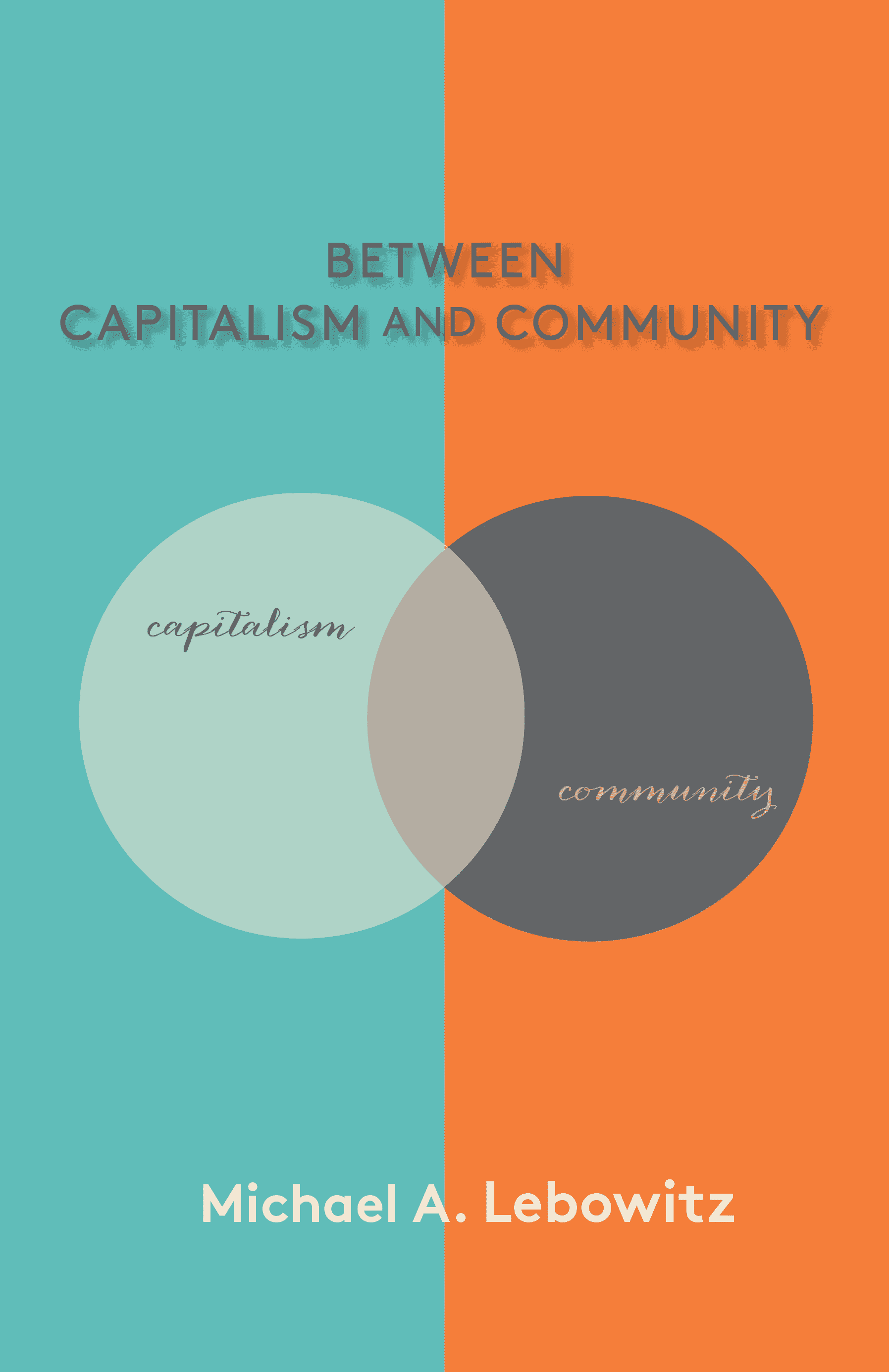Books
1991, 2003
London: Macmillan
Beyond Capital: Marx’s Political Economy of the Working Class
Winner of The Deutscher Memorial Prize 2004. In a completely reworked edition of his classic (1991) volume, Michael A. Lebowitz explores the implications of the book on wage-labour that Marx originally intended to write. Focusing upon critical assumptions in Capital that were to be removed in Wage-Labour and upon Marx’s methodology, Lebowitz stresses the one-sidedness of Marx’s Capital and argues that the side of the workers, their goals and their struggles in capitalism have been ignored by a monolithic Marxism characterized by determinism, reductionism and a silence on human experience.
OTHER EDITIONS:
Más allá de El Capital: La economia politica de la clase obrera en Marx (Madrid: Akal Ediciones, 2005)
Beyond Capital. Turkish edition with special Afterword (Istanbul: Phoenix Publishing House, 2006)
Más allá de El Capital: La economia politica de la clase obrera en Marx (Caracas: Monte Avila, 2007)
Beyond Capital. Chinese edition with special Preface and Biographical Note (Beijing: Scientific Press, 2007)
Más allá de El Capital: la economia politica de la clase obrera (La Habana: Editorial de Ciencias Sociales, 2008)
Beyond Capital: Marx’s Political Economy of the Working Class” (Serbian edition-)(Belgrade, Centar Za Politike Emancipacije, 2018
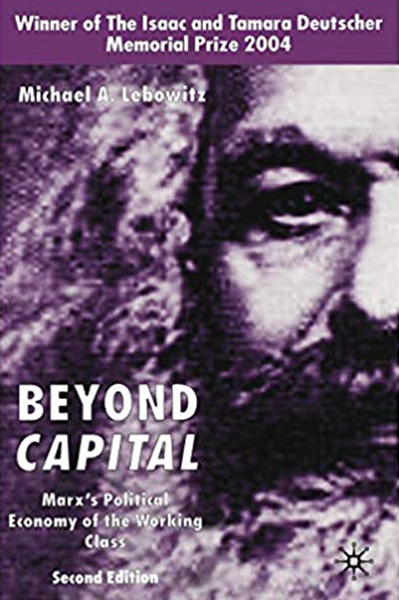
2006
New York: Monthly Review Press
Build it Now: Socialism for the Twenty-first Century
Build It Now puts forward a clear and innovative vision of a socialist future, and at the same time shows how concrete steps can be taken to make that vision a reality. It shows how the understanding of capitalism can itself become a political act—a defense of the real needs of human beings against the ongoing advance of capitalist profit.
Throughout the book, Lebowitz addresses the concerns of people engaged in struggle to create a better world, but aware that this struggle must be informed by the realities of the twenty-first century. Many chapters of the book began life as addresses to worker organizations in Venezuela, where worker self-management is on the agenda. Written by an eminent academic, this is far more than an academic treatise. The book brings an internationalist outlook and vast knowledge of global trends to bear on concrete efforts to transform contemporary society.
Build It Now is a testament to the ongoing vitality of the Marxist tradition, drawing on its deep resources of analytical insight and moral passion and fusing them into an essential guide to the struggles of our time.
OTHER EDITIONS:
Build it Now: Socialism for the Twenty-first Century (Delhi, India: Daanish Books, 2006)
Build it Now: Socialism for the Twenty-first Century. Norwegian edition with special Preface (Oslo, Norway: Rote, 2007)
Construyamoslo Ahora: El Socialismo para el Siglo XXI (Caracas: Centro Internacional Miranda, 2007)
Build it Now: Socialism for the Twenty-first Century. Hindi, Malayalan editions (2008)
Build it Now: Socialism for the Twenty-first Century. Turkish edition (Istanbul: Yordan Kitap, 2008)
Build it Now: Socialism for the Twenty-first Century. Korean edition (Seoul:Paddie, 2008)
Build it Now: Socialism for the Twenty-first Century. Greek edition (Athens: Antilogos, 2009)
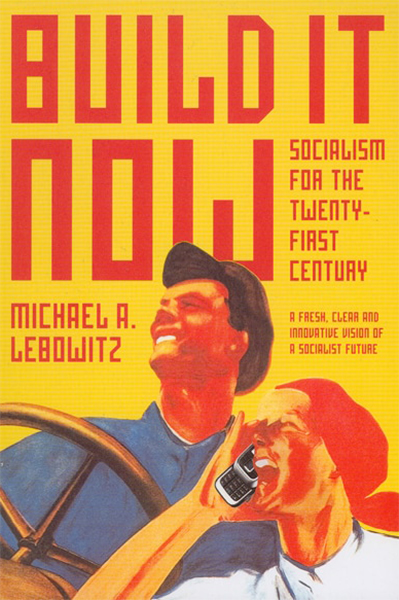
2009
Toronto: The Socialist Project
The Path to Human Development: Capitalism or Socialism?
OTHER EDITIONS:
The Path to Human Development: Capitalism or Socialism? (Karnataka, India: Books for Change, 2009).
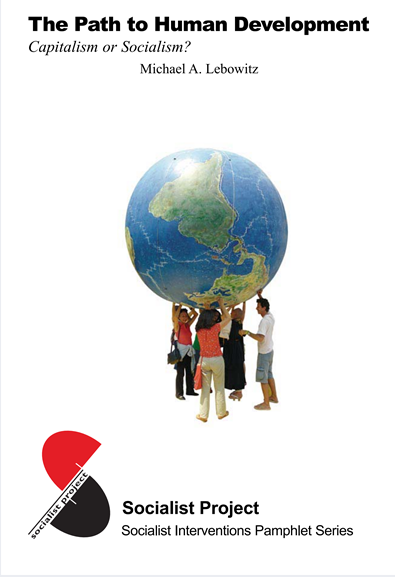
2009
Leiden: Brill Academic Publishers
Following Marx: Method, Critique and Crisis
What does it mean to follow Marx? In this examination of Marx’s methodology combined with specific applications on topics in political economy such as neo-Ricardian theory, analytical Marxism, the falling rate of profit, crisis theory, monopoly capital, Paul Sweezy, advertising and the capitalist state, this volume argues that the failure to understand (or explicit rejection of) Marx’s method has led astray many who consider themselves Marxists. By focusing particularly upon the concept of a totality and the necessary form of appearance of capital as many capitals in competition, Following Marx both demonstrates why Marx insisted that ‘in competition everything is reversed’ and provides a guide for following Marx.
OTHER EDITIONS:
Following Marx: Method, Critique and Crisis (Chicago: Haymarket Press, 2009).
Following Marx: Method, Critique and Crisis (Delhi: Daanish Books, 2012). Includes Introduction for the Indian edition.
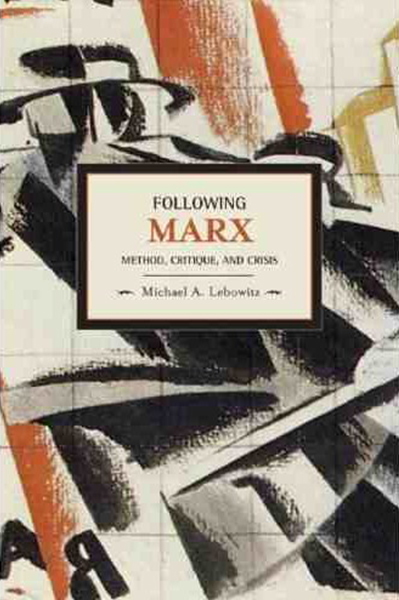
2010
New York: Monthly Review Press
The Socialist Alternative: Real Human Development
“A good society,” Michael Lebowitz tells us, “is one that permits the full development of human potential.” In this slim, lucid, and insightful book, he argues persuasively that such a society is possible. That capitalism fails his definition of a good society is evident from even a cursory examination of its main features. What comes first in capitalism is not human development but privately accumulated profits by a tiny minority of the population. When there is a conflict between profits and human development, profits take precedence. Just ask the unemployed, those toiling at dead-end jobs, the sick and infirm, the poor, and the imprisoned.
But if not capitalism, what? Lebowitz is also critical of those societies that have proclaimed their socialism, such as the former Soviet Union and China. While their systems were not capitalist and were capable of achieving some of what is necessary for the “development of human potential,” they were not “good societies.” A good society as Lebowitz defines it must be marked by three characteristics: social ownership of the means of production, social production controlled by workers, and satisfaction of communal needs and purposes. Lebowitz shows how these characteristics interact with and reinforce one another, and asks how they can be developed to the point where they occur more or less automatically—that is, become both a society’s premises and outcomes. He also offers fascinating insights into matters such as the nature of wealth, the illegitimacy of profits, the inadequacies of worker-controlled enterprises, the division of labor, and much more.
OTHER EDITIONS:
The Socialist Alternative: Real Human Development (Delhi: Aakar Books, 2010)
The Socialist Alternative: Real Human Development. Slovenian lanaguage edition (UP&UNDERGROUND Proljeće 2010)
La Alternativa Socialista: El Verdadero Desarrollo Humano (Caracas: Monte Avila, 2013)
La Alternativa Socialista: El Verdadero Desarrollo Humano (Havana: Ciencias Sociales, 2015)
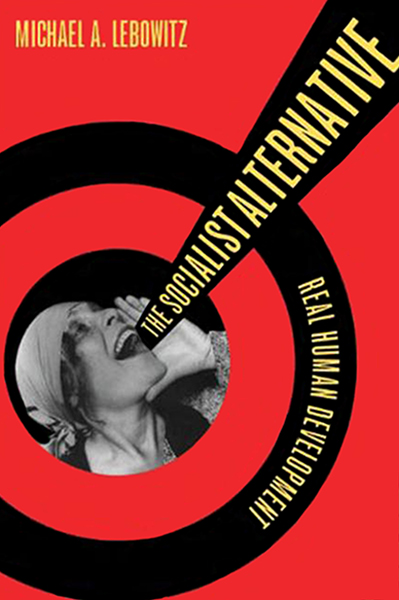
2012
New York: Monthly Review Press
The Contradictions of Real Socialism: The Conductor and The Conducted
Cover to Chap. 2 Chap. 3-6 Chap. 7 – end
What was “real socialism”—the term which originated in twentieth-century socialist societies for the purpose of distinguishing them from abstract, theoretical socialism? In this volume, Michael A. Lebowitz considers the nature, tendencies, and contradictions of those societies. Beginning with the constant presence of shortages within “real socialism,” Lebowitz searches for the inner relations which generate these patterns. He finds these, in particular, in what he calls “vanguard relations of production,” a relation which takes the apparent form of a social contract where workers obtain benefits not available to their counterparts in capitalism but lack the power to decide within the workplace and society.
OTHER EDITIONS:
Contradictions of ‘Real Socialism’: the Conductor and the Conducted (Delhi: Aakar Books, 2013).
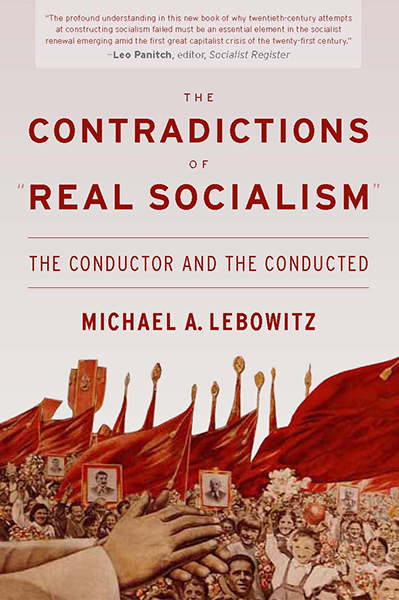
2015
New York: Monthly Review Press
The Socialist Imperative: From Gotha to Now
In a little more than a decade, economist Michael A. Lebowitz has written several major works about the transition from capitalism to socialism: Beyond Capital (winner of the Deutscher Prize), Build It Now, The Socialist Alternative, and The Contradictions of “Real Socialism.” Here, he develops and deepens the analysis contained in those pathbreaking works by tracing major issues in socialist thought from the nineteenth century through the twenty-first.
Lebowitz explores the obvious but almost universally ignored fact that as human beings work together to produce society’s goods and services, we also “produce” something else: namely, ourselves. Human beings are shaped by circumstances, and any vision of socialism that ignores this fact is bound to fail, or, at best, reproduce the alienation of labor that is endemic to capitalism. But how can people transform their circumstances in a way that allows them to re-organize production and, at the same time, fulfill their human potential? Lebowitz sets out to answer this question first by examining Marx’s Critique of the Gotha Programme, and from there investigates the experiences of the Soviet Union and more recent efforts to build socialism in Venezuela. He argues that socialism in the twenty-first century must be animated by a central vision, in three parts: social ownership of the means of production, social production organized by workers, and the satisfaction of communal needs and communal purposes. These essays repay careful reading and reflection, and prove Lebowitz to be one of the foremost Marxist thinkers of this era.
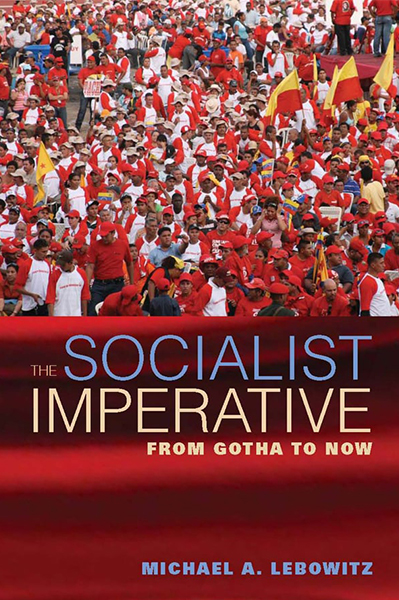
2021
New York: Monthly Review Press
Between Capitalism and Community
Link to publisher
In this book, Michael Lebowitz deepens the arguments he made in his award-winning Beyond Capital. Karl Marx, in Capital, focused on capital and the capitalist class that is its embodiment. It is the endless accumulation of capital, its causes and consequences, that are central to Marx’s analysis. In taking this approach, Marx tended to obscure not only the centrality of capital’s “immanent drive” and “constant tendency” to divide the working class but also the political economy of the working class (“social production controlled by social foresight”). In Between Capitalism and Community, Lebowitz demonstrates that capitalism contains within itself elements of a different society, one of community.
Whereas Marx’s intellectual construct of capitalism treats it as an organic system that reproduces its premises of capital and wage-labor (including a working class that looks upon the requirements of capital “as self-evident natural laws”), Lebowitz argues that the struggle of workers in common and activities based upon solidarity point in the direction of the organic system of community, an alternative system that produces its own premises, communality, and recognition of the needs of others. If we are to escape the ultimate barbarism portended by the existing crisis of the earth system, the subordination of the system of capitalism by that of community is essential. Since the interregnum in which capitalism and community coexist is marked by the interpenetration and mutual deformation of both sides within this whole, however, the path to community cannot emerge spontaneously but requires a revolutionary party that stresses the development of the capacities of people through their protagonism.
This book should be mandatory for all economics, political science, and social philosophy classes. Comrades—especially younger ones—will find it immensely helpful for years to come. The sweep of the work is truly impressive; comprehensive and clear on everything essential for understanding the horrors of capitalism and the paths toward a better world. In this period of political madness, Lebowitz’s message of political hope could not be timelier.
—Tony Smith, Professor of Philosophy and Political Science, Iowa State University; author, Beyond Liberal Egalitarianism: Marx and Normative Social Theory for the Twenty-First Century
This book is in the Monthly Review tradition of not only showing with great perspicacity the breadth and depth of Marx’s remarkable examination of capitalist society, but also understanding that radical scholars have an obligation to further deepen and extend Marx’s work. In twelve concisely and clearly written chapters, Lebowitz, among the best radical economists in the world, shows that in Capital, Marx failed to fully appreciate that the accumulation of capital results in two products—commodities of all kinds and the workers themselves. The latter, the ‘second product’ of capitalist production, is shaped by capital so that the working class is both badly divided and not fully cognizant of an all-encompassing alienation. Equally missing from Capital is a full grasp of how the collective actions of workers not only improve their life circumstances but also radically change them, preparing them to become society’s eventual protagonists, those who will abolish capitalism and create the collective commonwealth, which alone can overcome the multiple crises that now confront us, especially ecological disaster.
—Michael D. Yates, author, Can the Working Class Change the World?
In this admirable and timely book Michael Lebowitz deepens and extends the understanding of capitalism that he developed in his prize-winning Beyond Capital. He argues persuasively that building critically on Marx’s conceptualisation of capitalism as an organic system is indispensable to diagnosing the ills of the contemporary world—in particular the growing ‘crisis of the Earth System’ that threatens to overwhelm us. In conclusion Lebowitz draws on his considerable practical experience of contemporary socialist movements to map out the path to Community—the alternative system that represents our sole means of escape from this crisis.
—Alex Callinicos, former Professor of European Studies, King’s College London
In this insightful contribution Michael Lebowitz continues to rigorously demonstrate the one sidedness of Marx’s understanding of capitalism in Capital and shifts Marxism, as a dialectical and systems view of the world, to new ground. A powerful theoretical argument is made for the system of organic community, both as crucial for Marxist thought and as a terrain of struggle to achieve the political economy of the working class. Lebowitz’s contribution is indispensable to the renewal of Marxism and socialism in the 21st century. It is essential reading to understand the importance of solidarity in these times of senile and catastrophic capitalism.
—Vishwas Satgar, Principal Investigator Emancipatory Futures Studies; Editor of the Democratic Marxism series, University of the Witwatersrand, South Africa
This book is a provocation, as much for traditional Marxists as for the various schools of nontraditional Marxism. It puts the question on the table of whether Marx’s Capital could be an obstacle for understanding class struggle and revolutionary practice. Michael Lebowitz questions what is taken for granted by the majority of Marxists. He draws conclusions from this critique, which also influences the offered vision of a non-capitalist future. This book, a peak in his series of interconnected books starting in 1992 with his Beyond Capital, is extremely important, scientifically as well as politically. It will provoke exactly the deep theoretical struggle that a non-dogmatic, non-authoritarian left needs.
—Michael Heinrich, author, Karl Marx and the Birth of Modern Society
For some time now Michael Lebowitz has been patiently and provocatively remaking our conception of Marx’s Capital and the potentials for human development. In standing against a ‘one-sided’ reading of Marx for an insistence on seeing workers struggling to make their own world, Lebowitz has pushed to the side stale, top-down theses of social transformation through statist planning set apart from workers’ organization and participation. Indeed, in his essential new book it is the building of workers’ capacities and communities that transforms circumstances and contexts in a process of contested reproduction against capital. This is a directive to think of community not as a romanticized place standing against the storms of an outside world, but community as a process of struggle to meet and self-govern over common needs against the ceaseless demands of accumulation, alienated work, and the vandalism of the earth. Could any text be more important to read, discuss and debate in the harsh times we face today?
—Greg Albo, Professor of Political Economy, York University; coeditor, The Socialist Register 2021: Beyond Digital Capitalism
Michael Lebowitz is certainly no faithful disciple of Marx. But he can claim to incarnate the best type of ‘Marxist’ that we need to break the circle of the capitalist rush to the destruction of the planet and the post-socialist ideological paralysis: resuming the critique of the economy at the point of Ricardo’s default, where Marx himself had backed, and pushing the dialectical idea of ‘contested reproduction’ to the lively conflict of the two histories that inhabit our world and our lives. A book as clear and straightforward as it is radical.
—Etienne Balibar, coauthor, Reading Capital
